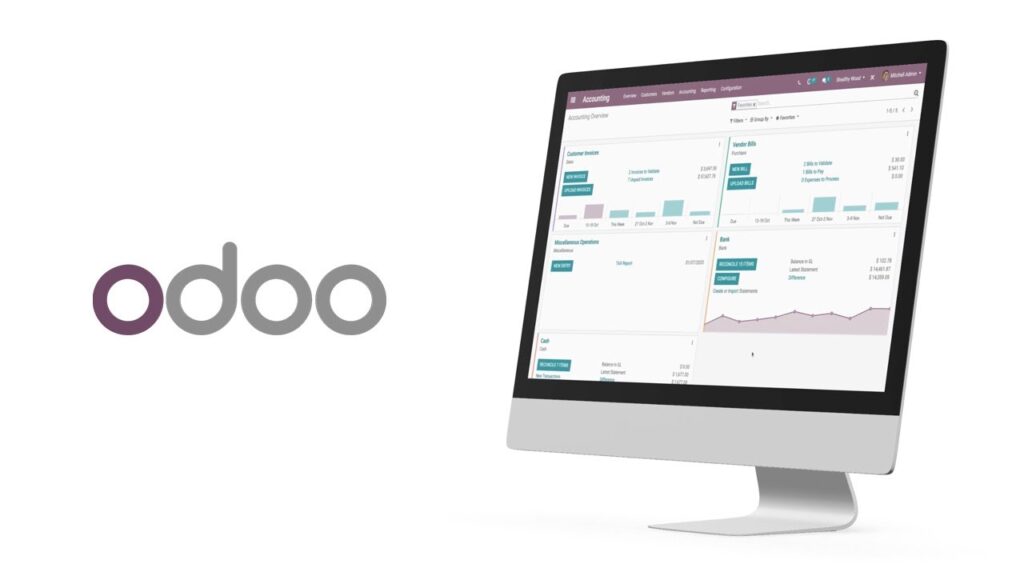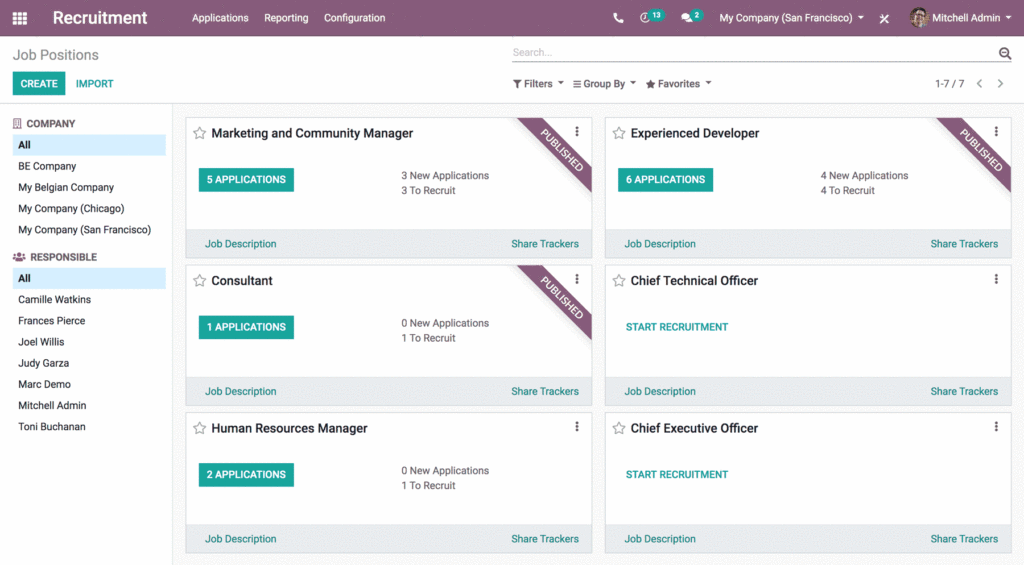In the bustling world of business, a powerful tool called Odoo is being embraced by numerous prominent companies. Let’s take a closer look at some of these companies:
1. Toyota
A well-known automotive giant, Toyota utilizes Odoo to streamline and enhance various aspects of its operations.
2. Delmonte Quality
This company, specializing in delivering quality products, relies on Odoo to manage a wide range of activities, including inventory and customer interactions.
3. Sodexo
Sodexo, a major player in facilities management and food services, employs Odoo to efficiently manage its complex operations.
4. WWF (World Wildlife Fund)
Even organizations dedicated to preserving our planet, like WWF, harness Odoo’s capabilities to manage their diverse tasks and resources.
5. Decathlon
Renowned for its sports goods, Decathlon utilizes Odoo to facilitate activities such as sales, customer relations, and inventory control.
6. ATB
In the financial sector, ATB employs Odoo to ensure smooth functioning of various processes, ranging from customer management to accounting.
7. Santafixie
This company in the cycling industry turns to Odoo for optimizing their business processes, from sales to inventory tracking.
8. Sock Club
Odoo supports Sock Club in efficiently managing their production, sales, and customer service operations in the dynamic world of fashion.
9. Scarpetta Shoes
A prominent name in the shoe industry, Scarpetta Shoes relies on Odoo to coordinate various aspects of their business, ensuring seamless operations.
10. KOGLAND Commerce Pvt
KOGLAND Commerce Pvt leverages Odoo to simplify their business operations and improve overall efficiency.
These companies trust Odoo ERP to manage their multifaceted operations, covering everything from online sales and point-of-sale transactions to customer relationship management, accounting, procurement, and keeping track of their inventory.
One of the remarkable features of Odoo is its ability to troubleshoot issues by identifying problems and getting to the root cause.
At its core, Odoo is an all-encompassing management software that offers an impressive array of business applications. These applications collectively form a comprehensive suite of tools for managing various aspects of an enterprise.
It’s important to keep in mind that the list provided here is not exhaustive. Many other significant companies across different industries also make use of Odoo to elevate their business processes.
Moreover, the specific ways in which each company uses Odoo can vary significantly.
Depending on their unique business requirements, companies can choose from a variety of modules offered by Odoo to tailor the software to their needs.
As a result, Odoo emerges as a versatile solution that adapts to the distinctive demands of different businesses.
Read also: Which Odoo Version Is The Best For Your Business
What are the benefits of using Odoo for big companies?
Odoo is a well-known type of software used by many big companies all around the world. This software is really helpful for these companies, and here are some of the reasons why:
1. Growing in a Smart Way
Companies that use Odoo can start by using just a small part of the software. Then, as time goes on, they can add more parts that their business needs. This is a smart way to grow because it helps companies become bigger in an organized manner. They can make their operations bigger when they need to.
2. All Information in One Place
When a company uses Odoo, all the important information is kept in one place. This makes it easy for the company to get the information when they need to make decisions. This saves time and money because everything is together. It’s also cheaper than having many different systems for different things.
3. Saving Money
Using Odoo is a good way for companies to save money. It’s not as expensive as other software like SAP or Oracle. Even though the first cost might seem big, companies will end up spending much less money on other things.
4. Easy to Use
Odoo is made in a way that’s easy for people to understand and use. Even though it can do many complicated things for big companies, it’s still easy to work with. There are lots of different tools that can help different parts of the company, from selling things better to managing projects and keeping track of things in the stock.
5. Making It Fit
Companies can change Odoo to fit their own needs. This is called customization. It’s really flexible, so companies can make it work exactly how they want. This helps them do their work better and make choices faster.
6. Everything Works Together
Odoo makes sure all the different parts of the company work together. This helps the company see everything that’s happening and report on it. It also helps with making things happen automatically. This is good for sharing information between different parts of the company in a safe way.
7. Doing Things Better
Using Odoo helps companies do things in a better way. It makes the processes smoother and can do tasks automatically that used to take a lot of time. This means the company can learn more about their business and do things smarter.
To Sum Up
In short, Odoo has lots of good things to offer big companies. It helps them grow in a smart way, keeps all their important information together, saves them money, is easy to understand, fits their needs, makes everything work together, and helps them do things better. These benefits help companies improve how they work, make choices based on data, and make their business even bigger.
Read also: Is Odoo A Good ERP For Your Business?
How do big companies use Odoo in their operations?
Big companies find Odoo to be an invaluable tool for handling various aspects of their business operations. Here’s a closer look at the diverse ways in which big companies utilize Odoo:
1. Efficient Process Management
Odoo plays a vital role in assisting big companies in effectively managing their business processes. By automating manual tasks and streamlining workflows, Odoo reduces the need for time-consuming processes. This, in turn, grants valuable insights into the workings of the business.
2. Centralized Information Hub
Odoo serves as a central repository for all company information. This consolidation makes it simpler to access and use information for informed decision-making. By having everything in one place, time and money are saved at the operational level, making it a more cost-effective solution compared to managing multiple systems.
3. Streamlined Manufacturing
For big companies, Odoo proves to be an essential aid in centralizing manufacturing data. This simplifies the management and optimization of manufacturing processes, ultimately leading to greater efficiency.
4. Enhanced Client Relationship Management (CRM)
Odoo extends its support to big companies in effectively managing their client relationships. The comprehensive CRM module empowers them to handle leads, opportunities, and interactions with customers, resulting in improved client relationships.
5. Strategic Workforce Planning
Big companies rely on Odoo’s comprehensive HR module for strategic workforce planning. It assists in managing crucial employee data, attendance, and payroll, enabling proactive workforce management.
6. Efficient Resource Management
Odoo also comes to the aid of big companies in resource management. With its comprehensive project management module, businesses can effectively manage tasks, projects, and resources, leading to better resource allocation.
7. Tailored Customization
One of Odoo’s standout features is its high level of customization. This capability allows big companies to tailor the software to fit their specific business needs. This adaptability translates to improved productivity and agile decision-making.
Big companies adopt Odoo for a range of purposes such as process management, centralized information handling, optimized manufacturing, client relationship management, workforce planning, and resource management.
The software’s adaptability ensures it aligns precisely with a company’s unique requirements, offering benefits like improved business processes, data-driven decisions, and overall business growth.
Related: The Best Odoo Hardware Requirements For Success
What are the challenges of implementing Odoo in big companies?
When big companies decide to use Odoo, there are certain difficulties they might encounter. These are common issues that these companies might face during the process of implementing Odoo:
1. Customization
Customization is when businesses make changes to Odoo so that it fits their exact needs. However, doing too much customization can make the process of using Odoo more complicated and difficult. It’s important to find the right balance between making custom changes and using the standard parts of Odoo.
2. Employee Adoption
Teaching employees to use a new system like Odoo can be hard, especially if they’re used to a different system. To solve this challenge, it’s important to provide proper training and communicate clearly about the changes.
3. Implementation Vision
Having a clear plan for how to use Odoo is really important. If the plan is not clear, it can be hard to make the most of Odoo for the business. A well-defined plan that explains what steps to take and when to take them can help a lot.
4. Executive Buy-In
Getting support from the top leaders of the company is crucial when implementing Odoo. If the executives don’t support the change, it can be very difficult to succeed. Having the leaders on board can make a big difference.
5. Data Migration
Moving data from old systems to Odoo can be tricky and take a lot of time. It’s really important to plan carefully and carry out the data move in a smooth way.
6. Integration with Old Systems
Connecting Odoo to old systems can be hard, especially if those old systems are outdated or don’t work well with Odoo. Good planning and careful execution can help to overcome this problem.
7. Technical Expertise
Setting up Odoo requires knowing a lot about technology. Having a team of people who know about technology and have done this kind of work before can make the implementation successful.
Remember, these challenges are common, but they might be a bit different for each company. If you’re going through this process, it’s a good idea to work with a group that has experience with Odoo.






